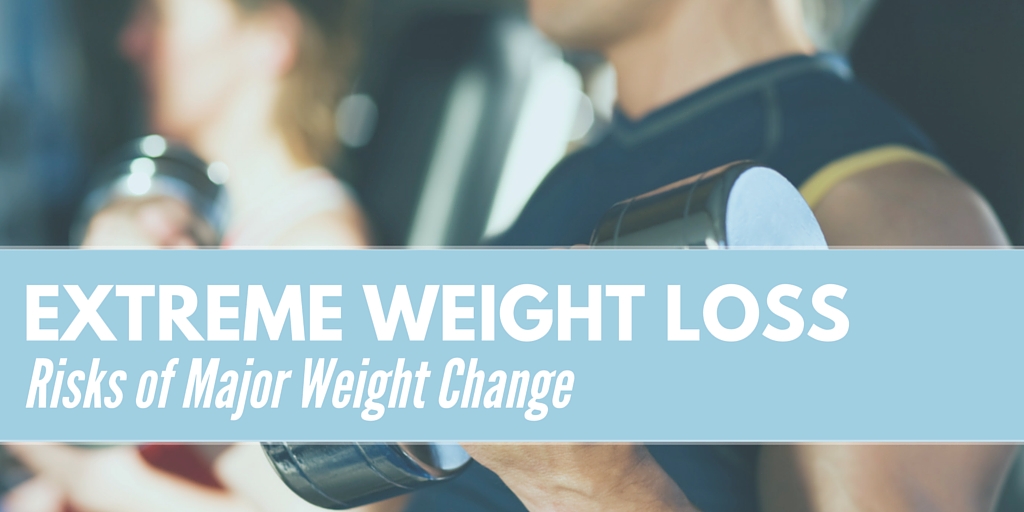As a society, we have a large number of people who are quite overweight. With so many overweight individuals, people are often trying to lose a lot of weight as fast as they can. As a culture, we have grown to celebrate extreme weight loss as a successful achievement.
Of course, losing weight is an achievement worth celebrating as there are many health risks associated with being overweight. However, losing weight in an extreme manner also causes some difficulties for your body. Because of these difficulties, healthy diets only aim for a 1 or 2-pound loss every week.
This may seem daunting if you need to lose 20 pounds, and it may seem like an impossible plan if you need to lose even more weight than that. To avoid dieting for what may seem like endless weeks, many people just lose as much weight as they can as quickly as they can. However, it is important to know some of the risks of major weight change before pursuing major weight loss, so here they are.
Risks of Extreme Weight Loss:
Hair Loss –
Weight is not the only thing on its way out. People have shown strong tendencies to experience hair loss because of the major weight loss. In order to lose a lot of weight very quickly, dieters decrease their caloric-intake to minimal levels to ensure extreme weight loss. Because of this, the diet fails to nourish the body adequately. Specifically, a lack of adequate protein and iron commonly causes dieters to lose hair as well as weight.
Fatigue–
Again, extreme weight loss requires an extreme decrease in caloric-intake. The failure to consume a sufficient amount of calories leads dieters to chronically feel lethargic and fatigued. This compromises one of the most significant aspects of healthy weight loss, which is exercising. Making exercise impossible due to the lack of energy, dieters cannot ensure their health through exercise. The decrease in calories results in an overall decrease in your body’s metabolism, which also contributes to the lower levels of energy and makes it more difficult to maintain the weight loss.
Excess Skin –
Another issue with extreme weight loss occurs because the rest of your body has difficulties keeping up with the weight loss. Particularly, your skin can have a very difficult time adjusting to your body’s new size since tightening to your body’s new shape would have to take place slowly and steadily. So, extreme weight loss does have the risk of leaving excess skin hanging around your body. This can be especially negative for dieters that were already self-conscious of their weight, as the excess skin is usually noticeable to others furthering the risk of self-consciousness for the dieter.
Dehydration –
Although you can certainly drink water in extreme-weight-loss diets, extreme weight loss still results in risks of dehydration. By demanding your body to cut as much weight as it can as soon as it can, your body rids weight in different ways. One of the most common sources of weight loss when extreme weight loss occurs quickly is the body’s water. Much of the weight loss is then water weight, putting the body at risk of dehydration, which can be extremely dangerous.
Decreased Cognitive Ability –
Your brain functions normally and effectively so long as your body maintains its health. Extreme weight loss often strongly limits the glucose that your brain needs to function effectively. The lack of adequate glucose for the brain will leave people in a fog as they are unable to focus as well as before. A lot of empirical research indicates that people struggle more with complicated cognitive tasks while they are dieting. This is also why eating a good breakfast can make a large difference on test performance or your work performance in general.
Poorer Moods –
When someone goes on a diet, especially one that may result in extreme weight loss, their goal must be to better their life in general to some degree. So, while people diet to feel better in some ways, extreme weight loss can cause the opposite. Many people report various feelings of depression that accompany their extreme weight loss. Additionally, one of the most commonly reported changes in mood is the decrease in sex drive. These seem to contradict some of the intentions of extreme weight loss.
Although dieting and major weight change is typically the result of people wanting to make their life, health, and well-being a bit better, extreme weight loss can surely cause more damage and issue to your body, and life, in general. In an attempt to increase your health, there is no need to create another unhealthy situation by losing weight at an extreme rate or volume. Rather, just as people tend to put on extra weight slowly and steadily, they should focus on losing weight in the same manner. Weight loss is a long-distance race and reaching your ideal weight requires a steady pace of about 1-2 pounds per week in order to avoid the risks of extreme weight loss.

